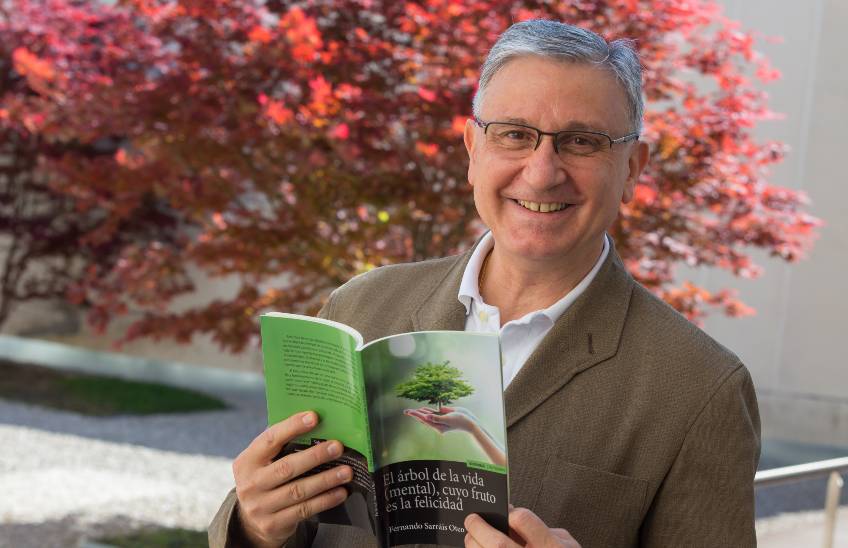noticia_EYP_13_05_2021_libro-Sarrais
Training for greater control of one's own mind and a positive attitude are vaccines for good mental health.
Dr. Fernando Sarrais analyzes the characteristics for a happy life in his new book

FotoManuelCastells/University of Navarra professor Fernando Sarrais, with his latest book
13 | 07 | 2021
"The best antidote for negative feelings are positive ones, for tension and depression is relaxation and good humor; for loneliness and disaffection, company and affection". Fernando Sarrais, doctor, psychiatrist and professor of the School of Education and Psychology of the University of Navarra bets to exercise the mind to have a greater control of the same one, and "to throw of her what makes us suffer when it is useless to turn it around mentally". His recipe to achieve this goal is to concentrate the mind on what it should be doing, and act to improve the status, instead of just turning things over in your head.
"The pandemic is a negative circumstance that entails many setbacks and limitations that cause discomfort and suffering, which have produced negative feelings in many people, with a variable intensity depending on the personality and the presence or absence of previous mental disorders in each individual," he explains. The particularly negative aspect of the pandemic, the psychiatrist points out, has been the prolonged duration and the suffering of loved ones due to the symptoms of the disease and the deaths it has caused, "which has exhausted and exceeded the defense mechanisms against the suffering of many people".
The expert affirms that those who have suffered the most have been the negative, fearful, anxious people, as they have seen their negative emotional state increase to the point of presenting symptoms of an anxiety disorder and depression, which are the most frequent mental pathologies. Likewise, he points out that it is still early to evaluate the psychological consequences, but he believes that "many people, families and institutions have been strengthened, have reorganized their hierarchy of values and have modified their lifestyle for a better one".
Dr. Sarrais attributes the increase in mental illness in recent years to a low interest in wellness and mental health, compared to the high general interest in health care and physical appearance. He considers that the core of many mental disorders lies in the imbalance of mental functions, that is, an imbalance between reason and will, on the one hand, and affectivity, on the other; which are often in conflict, and cause distress. And he adds: "the balance between the head and the heart of healthy and mature people must be a hierarchical balance, since it is the reason that must direct the functioning of the mind, since it is the one that judges the best way to live in order to be happy".
He also explains that a psychologically immature person is more prone to suffer mental disorders in moments of personal and social crisis. In this type of person, subject , the mind usually works on the impulse of affectivity, which seeks the way to feel good in the present moment, even if he or she later suffers for having acted incorrectly. Likewise, the expert points out that personality disorders and the issue of immature people have increased due to the progressive neglect of the Education of character in families and schools. development "In addition, there is a widespread tendency to overprotect children and adolescents, which leads to a low tolerance to frustration and resilience, which makes people very fragile and psychologically vulnerable," he stresses.
Dr. Sarrais explains that poor self-control of affectivity on the part of the will makes the person impulsive and emotionally unstable, who often experiences intense emotions and negative feelings in the face of negative events in life, which make him suffer and drive him to behave negatively, even if he does not want to. On the other hand, he adds, this subject person is more prone to addictions and dependencies on behaviors and substances that make him feel good in the short term, but that he has to repeat again and again to feel again the well-being they produce. This way of life "makes it difficult to live according to the indications of his reason and the impulse of his free will, and prevents him from being happy". The dangers of this way of functioning and the strategies to avoid it are exposed by Dr. Sarrais in his last book graduate: 'The tree of (mental) life whose fruit is happiness', which has three branches that must be well developed to produce the fruit of happiness: rationality, freedom and positive affectivity (peace and joy).





